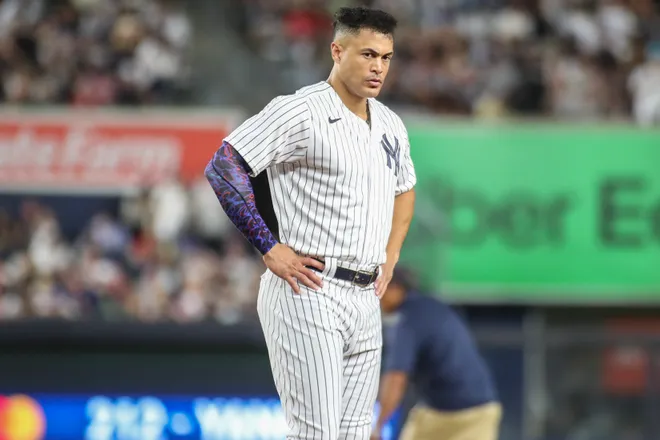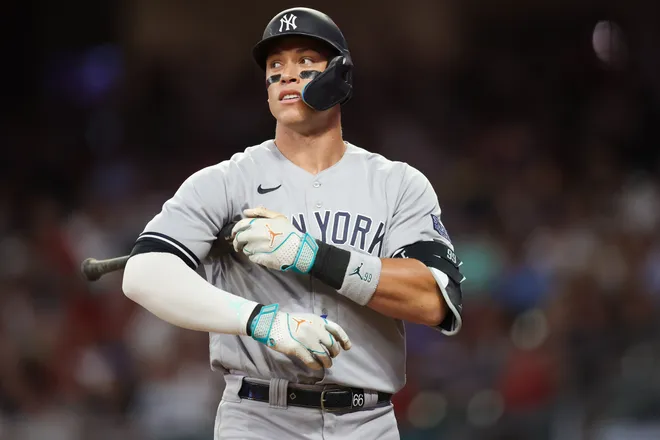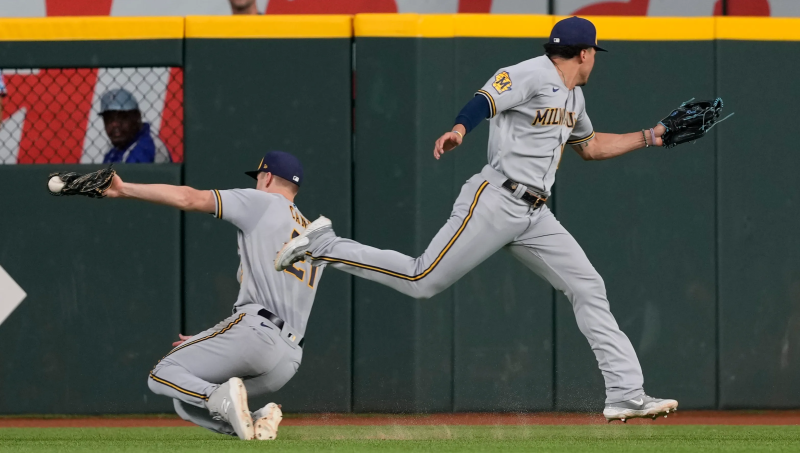Yankees bound for worst season this century. How low will they go?
That the New York Yankees will miss the playoffs this season is no longer in question.
After a three-game sweep by the Boston Red Sox at Yankee Stadium, New York’s playoff chances sit at 0.5%, according to Fangraphs. Manager Aaron Boone said the club has "got to be unbelievable the rest of the way" to have any chance, while acknowledging it must first win one game to win many.
Boone can’t say that it’s over, but with six teams to vault and a nine-game wild-card deficit to erase, it’s both a mathematic and pragmatic reality. And the only questions that remain are grim.
How historically bad are these Yankees? How did it get so ugly? Will it get worse in 2024 before it gets better?
USA TODAY Sports breaks down the key numbers from the Yankees’ pratfall.
FOLLOW THE MONEY: MLB player salaries and payrolls for every major league team
SPORTS NEWSLETTER:Sign up to get the latest news and features sent directly to your inbox

31: Years since last losing season
Sure, they’ve only won one World Series championship since their run of four titles in six years ended in 2000, but it’s not like the Yankees have been slacking in those other years. The Yankees have not finished below .500 since a rookie manager named Buck Showalter guided them to a five-win improvement – to 76-86 – in 1992.
Since then, through Showalter and Joe Torre and Joe Girardi and now the increasingly embattled Boone, New York has never finished upside down. The Yankees were 70-43 when a work stoppage canceled the 1994 World Series; they made the playoffs in 24 of the 28 seasons that followed.
That even included a mini-rebuild, when GM Brian Cashman flipped relievers Andrew Miller and Aroldis Chapman at the 2016 trade deadline, receiving future All-Star infielder Gleyber Torres. That drumbeat of consistency – even if it only netted the 2009 World Series title – will likely frame owner Hal Steinbrenner’s evaluation of Cashman.
Boone, finishing his sixth year as Yankees skipper, might not be so fortunate.
The Yankees head into the week 60-64 and Boston's weekend sweep left them six games behind the fourth-place Red Sox – perhaps cinching New York's first last-place finish since 1991. A few days after that campaign finished, manager Stump Merrill was fired.
$277 million: Yankees’ opening-day payroll
Only the crosstown Mets ($354 million) will spend more on salary (and get less for their buck) than the Yankees, this after Steinbrenner spent $360 million to retain Aaron Judge and $162 million for lefty Carlos Rodon.
Due largely to injuries, that gambit has failed.
Judge’s MVP season was derailed when a toe injury sent him to the injured list for more than two months. Rodon has only started six games due to multiple injuries, his season debut delayed until July 7.
While Steinbrenner’s decision to cast aside the caution that framed recent offseasons and embrace a payroll that sailed past the luxury tax ceiling was admirable, it still left multiple holes in the Yankees roster, amounting to a highly expensive half-measure.
Perhaps by next spring, the club can identify and sign a full-time left fielder, say. Yet unless Steinbrenner is more willing to go Full Steve Cohen and soar past even higher luxury tax thresholds, the financial parameters that define this club aren’t going away.

$909 million: Future salary commitments
Flexibility is not necessarily in the Yankees’ near-term future.
It’s not so much the $635 million they’ll pay Judge, ace Gerrit Cole and Rodon in coming years; Judge was a must-re-sign and Cole is a perennial Cy Young Award candidate the same way Judge is an MVP threat. While the jury is very much out on Rodon, he does have a healthy-year, injured-year pattern to his career and still has runway to produce a dominant season.
Yet their investments – even the modest ones – won’t send the Yankees to the poor house; rather, they just end up sticking them with an inflexible, unproductive roster.
Giancarlo Stanton, due $192 million through 2027, has hit .199 this season with a .281 on-base percentage and a 94 adjusted OPS in 74 games.
DJ LeMahieu ($45 million through 2026): .315 OBP, .680 OPS, 88 adjusted OPS in 102 games.
Anthony Rizzo ($23 million through 2024): .328 OBP, 12 homers, 96 adjusted OPS, 97 strikeouts in 99 games.
While greater health is certainly possible for that trio – particularly Rizzo, whose early season concussion went undiagnosed for nearly three months – all are between 33 and 35. There’s only so much ceiling – and only one DH spot to run all the Yankees’ thirtysomethings through to save wear and tear.
New York also has a dozen players due raises through salary arbitration in 2024, though some will likely be cut free. Most notably, Torres will command an eight-figure salary in his final year before free agency.
Torres, inconsistent since consecutive All-Star appearances in 2018-19, has long been considered trade fodder. Yet he’s one of just a handful of productive Yankees position players (his 2.1 WAR ranks only behind Judge and shortstop Anthony Volpe).
And anyone cut loose will simply have to be replaced.
7: Top 100 prospects in minor leagues
Woe unto those who buy too heavily into Yankees prospect hype. With that said, the club’s minor league system is decidedly robust for a club that perennially holds a poor draft position and hasn’t had the greatest track record of recent player development.
Yet with Volpe graduated, the Yankees still fared well in Baseball America’s midseason re-rank – and many of those players will get a big-league look very soon.
Most notably, second baseman Oswald Peraza should be up soon for the rest of this season, as the club determines if he’s Volpe’s long-term keystone partner – and more immediately, could prompt them to deal Torres this winter to fill other needs.
Outfielder Everson Pereira may join him, and immediately audition for that gaping hole in left field. Catcher Austin Wells also is close to big-league ready.
Meanwhile, their perpetual No. 1 – Dominican outfielder Jasson Dominguez – is getting closer. He’s hitting .380 with a 1.046 OPS this month at Class AA Somerset (New Jersey). Dominguez doesn’t turn 21 until Feb. 7 – right before his performance at big-league spring training will receive plenty of scrutiny.
Still, the Yankees will never be the Rays. Their biggest improvements will still come from the mighty checkbook, even if waiting for a Volpe or Dominguez might preclude them from dealing them for reinforcements or signing a top free agent to block them.
Perhaps they’re not far from that ideal, more sustainable mix of marquee players and development success stories.
For now, though, they have found an ugly middle ground, a state of limbo that has produced by far their worst season this century.
EYE ON THE FUTURE:Here are the most popular MLB future bets in 2023

Disclaimer: The copyright of this article belongs to the original author. Reposting this article is solely for the purpose of information dissemination and does not constitute any investment advice. If there is any infringement, please contact us immediately. We will make corrections or deletions as necessary. Thank you.







